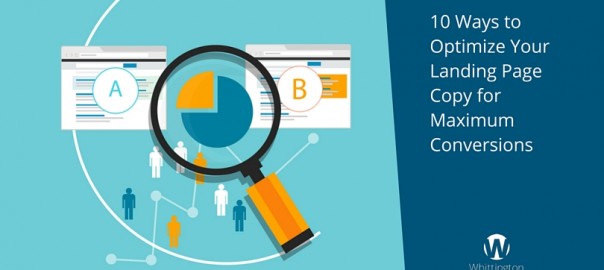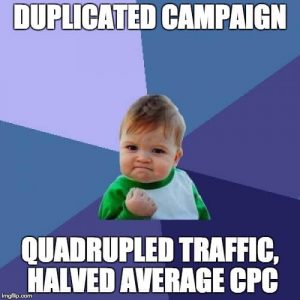 Did you know that marketers who invest in optimization have higher conversion rates? Using data-driven best practices, A/B testing and other forms of marketing data can boost your company’s lead generation potential. Research indicates that marketers are focusing effort and budget on conversion optimization, which includes editing landing pages. Here are 10 ways to ensure your website landing pages aren’t inhibiting your lead generation.
Did you know that marketers who invest in optimization have higher conversion rates? Using data-driven best practices, A/B testing and other forms of marketing data can boost your company’s lead generation potential. Research indicates that marketers are focusing effort and budget on conversion optimization, which includes editing landing pages. Here are 10 ways to ensure your website landing pages aren’t inhibiting your lead generation.
1. Include Data
Need to convince a prospect that visits your website of a particular concept? Third party data from an objective source can be convincing. Data that you’ve collected can be powerful, too. Does your product or service result in 30 percent cost savings for customers? Quantifying your product’s benefit can increase consumer trust in your landing page offer.
2. Highlight Customer Testimonials
Putting evidence of customer satisfaction on your landing pages can also improve credibility. Establish social trust by including your customer’s photo and a quote, website links or logos. Testimonial visibility increased conversions 34 percent in one WikJob case study.
3. Focus on Benefits
Does your landing page copy focus on your customers’ needs or does it highlight different aspects of your company? Does how long your company has been in business really mean that much to a customer? How much value can your prospects get via your eBook, template or a trial registration? The focal point of your landing page should be the value and benefit to the customer. The computer game Sims3 doubled their conversion rate by reworking the landing page’s value proposition.
4. Be Succinct
If your landing page copy exceeds 150-200 words, you’re losing prospect’s attention. Long-form copy on landing pages also reduces your chances of winning mobile conversions. When writing copy, ask yourself, “does my ideal customer really want or need to know this?”
5. Use Bullet Points and Lists
The vast majority of internet users skim copy. Using bullet points or a numbered list on landing pages to highlight benefits and data can capture the attention of page viewers. Using bullets and lists make your page more scannable. Also consider a wider variation between the point sizes of the text and headings to make your page easier to scan and digest.
6. Invest in a Stellar Headline
Your landing page headline is the first place your prospects look when arriving on a landing page. Make it count! Case studies say editing headlines can increase conversions by 93 percent or more. Make sure there’s “agreement” between your page headline and the link or call to action that brought them to the page. They should use the same language for better relevance.
7. Include Subheadlines
If your primary value proposition doesn’t fit in your headline, don’t cram too many words at the top of the page. Use subheadings to reinforce your page’s primary messaging. The key here is that the language must be customer-focused and contain a compelling reason for a reader to continue reading.
8. Add Video or an Image
Using video or images captures the attention of highly visual consumers. Use A/B testing to determine what works best. Software company Highrise increased sign ups 102 percent by adding a picture of a person to a landing page. Video can be compelling too, but keep it short — 20 to 45 seconds.
9. Write Simply
Use language on landing pages that reflects how your prospects communicate. You only have a few seconds to convince prospects to convert. It helps to run your landing page copy through an app like Hemingway or a Flesch–Kincaid readability test.
10. Shorten Your Lead Form
We haven’t talked about your lead forms, but keep them simple and don’t defy convention. Shorten the form as much as possible while still collecting only the data you need. Remember that if you need other information, you can ask for it post-conversion.
Digital & Social Articles on Business 2 Community(134)



